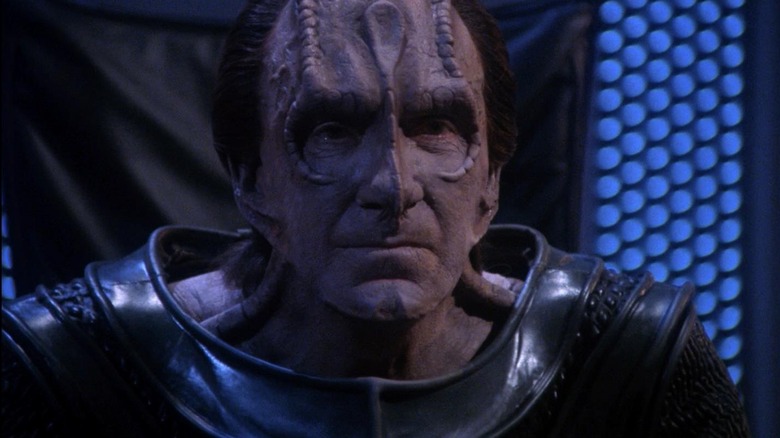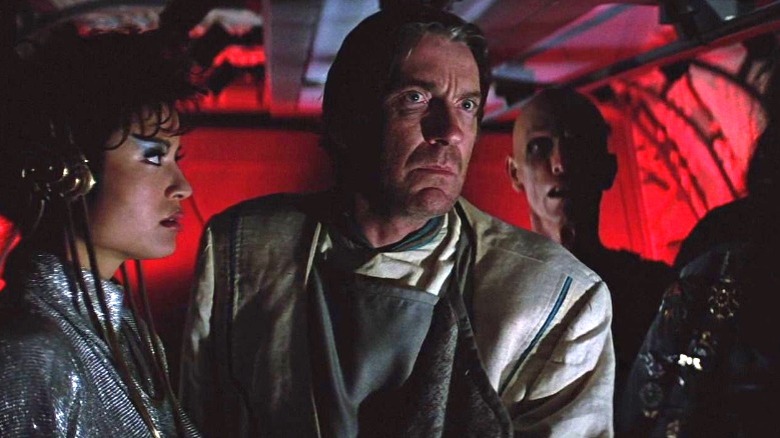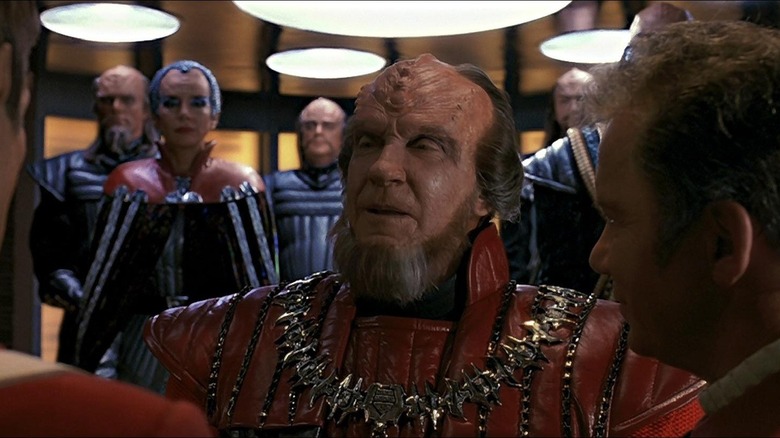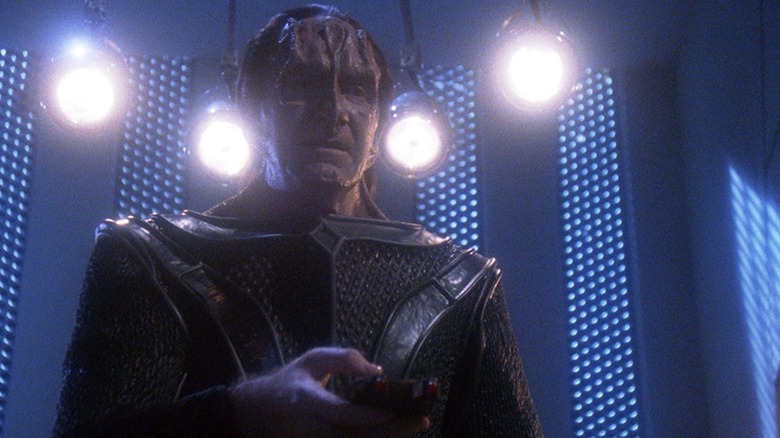The Three Iconic Star Trek Characters Played By David Warner
Actor David Warner died on July 24, 2022 at the age of 80, leaving behind a decades-long career of stage and screen that stretched from Shakespeare to "Freakazoid!" The Emmy-winning actor began his career in 1962, appearing on stage as an extra in "A Midsummer Night's Dream" and as Conrad in "Much Ado About Nothing." That same year, Warner garnered his first (uncredited) film appearance in the comedy "We Joined the Navy" as well as his first TV appearance in the televised play "Madhouse on Castle Street."
Since those early days, Warner worked constantly in films and TV, gathering a great deal of fans around him from his association with well-received genre films like "The Omen," "Time Bandits," "The Man With Two Brains," "Teenage Mutant Ninja Turtles II: The Secret of the Ooze," and many others. In 2001, he returned to theater, and entered a phase in his career where he could play King Lear one day and The Doctor from "Doctor Who" the next. His range, devotion, and enthusiasm will be missed.
Warner, as all Trekkies know, had a close relationship to "Star Trek," having appeared in two Trek feature films and on one series, each time playing a vastly different character. Warner left a deep impression, creating a memorable new addition to the franchise's canon. Indeed, one of Warner's roles is perhaps one of the best to ever emerge from "Star Trek: The Next Generation" in the series' single most intense episode.
St. John Talbot
Say what you will about William Shatner's 1989 film "Star Trek V: The Final Frontier" — and there are plenty of negative things that can be said — it certainly didn't lack for interesting ideas. The plot of that film involved a passionate Vulcan named Sybok (Laurence Luckinbill), secretly Spock's half-brother, taking hostages at a remote outpost in order to lure to Enterprise to their rescue. The outpost, located on Nimbus III, was meant to be an attractive galactic "neutral ground" where warring governments could come together for peaceful diplomatic negotiations. The outpost, however, failed long ago, and the ironically named Paradise City is now a desert wasteland overrun by criminals and alcoholics.
Into this sad place came three embittered and burnt-out diplomats — one from the Klingon Empire, one from Romulus, and one from Earth — meant to serve as Sybok's hostages. Warner played St. John Talbot, the human ambassador who, although only serving a supporting role, carried with him the weariness of a job done poorly. Talbot's professional skill had long since become useless, and it seemed as if he had fallen from a once-great height. Talbot's backstory is made more explicit in J.M. Dillard's novelization of "Star Trek V" which explains that he once failed during an important Andorian mission, and turned to booze and cigarettes in its aftermath. Talbot is one of the few smokers to appear on screen in "Star Trek" history.
Although none of that backstory is explained in the final film, Warner's performance manages to communicate Talbot's exhaustion. His first name makes him sounds like a saint. He wasn't.
Chancellor Gorkon
In Nicholas Meyer's 1991 film "Star Trek VI: The Undiscovered Country," Warner returned as a diplomat, only this time in a much more hopeful mode. In "Country," the entire Klingon moon of Praxis — a vital source of natural resources — explodes in a mining accident. The explosion leads the already-waning Klingon Empire reluctantly to the negotiation tables to finally talk about an end to the Cold Wars they and the Federation had been embroiled in for decades. Yes, "Country" is a metaphor for the falling of the Iron Curtain and the end of the real life Cold Ward between the United States and Russia (which had experienced a coup earlier that year). Praxis could even be seen as an analogue for the accident at Chernobyl. This is the most political of the Trek feature films.
In "Country," Warner plays Chancellor Gorkon, a high-ranking Klingon official who meets with Kirk (Shatner) face-to-face in order to attempt friendly relations. Diplomacy is rough going and the humans and Klingons don't necessarily get along very well; the intimidating General Chang (Christopher Plummer) seems upset that such let's-be-friends meetings are now required. Gorkon, however annoyed he might seem at meeting with humans, does indeed believe in a lasting peace and is determined to be on his best behavior. It will be Gorkon who will be assassinated by secret murderers in order to stymie peace talks.
Unlike his burnt-out diplomat in "Frontier," Warner brings an authoritative warmth to Gorkon. Kirk and co. are intimidated by him, but are careful to listen and welcome him. He's someone devoted to peace, but also someone you don't want to disappoint. When he arrives on the Enterprise, it's like your college professor is visiting your house. Don't say anything dumb in front of him.
Gul Madred
One of the better episodes of "Star Trek: The Next Generation" is a two-part espionage thriller called "Chain of Command" that aired at the end of 1992 in the middle of the show's sixth season. In it, Capt. Picard (Patrick Stewart) goes on a covert sting operation to destroy a secret Cardassian biological weapons facility. Picard finds no weapons, however, and is captured by the cold-eyed, soulless Gul Madred (Warner) who explains that the facility was a trap.
The second part of "Chain of Command" is devoted to the tête-à-tête between Madred and Picard, with Picard stripped of his clothes and his dignity and tortured incessantly. Madred attempts to sadistically impose his will on Picard, and it becomes clear that Madred doesn't so much need information as he needs to prove that humans are weak-willed and can be dominated. Picard, as he withers from starvation and injury, finds that Madred is, in fact, little more than a wounded bully, his Nazi-like thirst for dominance springing from a specific moment of childhood embarrassment.
The crux of "Chain of Command" is Madred shining four spotlights into Picard's eyes. He insists Picard admit there are, in fact, five lights. Picard, in the midst of torture, finds himself tempted into to seeing — into being convinced there are — five lights. This carries echoes of George Orwell's "1984," wherein the government insists it has the power to dictate that 2+2=5.
Warner is chilling as Madred, and the actor wholly projects the confidence, arrogance, and pathos of the character. He brought depth to the role, layering his performance to match the character's backstory. It's not an overstatement to say Madred is among the best "villain" characters in all of "Star Trek" — all thanks to the extremely talented Warner.



